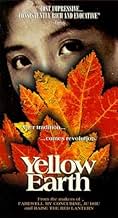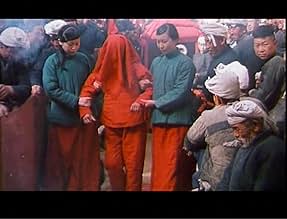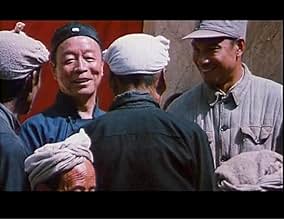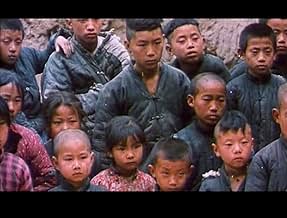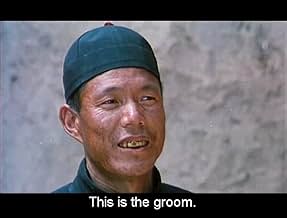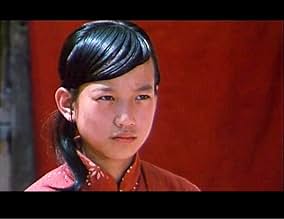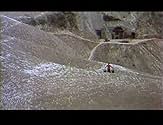IMDb RATING
7.1/10
2.7K
YOUR RATING
A communist soldier travels to Shanbei to collect folk songs for propaganda while visiting a poor peasant family, giving hope to the teenage daughter in escaping an arranged marriage.A communist soldier travels to Shanbei to collect folk songs for propaganda while visiting a poor peasant family, giving hope to the teenage daughter in escaping an arranged marriage.A communist soldier travels to Shanbei to collect folk songs for propaganda while visiting a poor peasant family, giving hope to the teenage daughter in escaping an arranged marriage.
- Awards
- 8 wins & 5 nominations total
- Director
- Writers
- All cast & crew
- Production, box office & more at IMDbPro
Featured reviews
A young slodier from the communist party is sent to northern China to collect some "happy" fols songs for helping the party boost army's morale during the battle against Japanese invasion in 1939 shortly before WW2. There he meets a farmer family- a father and 2 kids- but all songs they know is about endless suffering and pain.
Director Kaige Chen uses this setting to build up a rather interesting encounter between 1. a young soldier full of ideologies and strong beliefs and 2. a poor family in rural north China with extreme living difficulties and hardships. The young soldier believes that sickles and hammers will help these poor people and build them roads but we as viewers know that such things won't happen, we've seen that no ideology will end these circumstances.
The film is believed to be a Chinese communist propaganda vessel but what I gathered from this film was that it shows communism- maybe not directly- as yet another incompetent, useless set of beliefs.
This is not an enjoyable film, nor is it easy to watch. It feels really long for 86 minutes and it desparately needs a restoration. What it does however, is it opens discussions with friends, it makes people think and of course it's a very influential, historically important cinematic piece.
Director Kaige Chen uses this setting to build up a rather interesting encounter between 1. a young soldier full of ideologies and strong beliefs and 2. a poor family in rural north China with extreme living difficulties and hardships. The young soldier believes that sickles and hammers will help these poor people and build them roads but we as viewers know that such things won't happen, we've seen that no ideology will end these circumstances.
The film is believed to be a Chinese communist propaganda vessel but what I gathered from this film was that it shows communism- maybe not directly- as yet another incompetent, useless set of beliefs.
This is not an enjoyable film, nor is it easy to watch. It feels really long for 86 minutes and it desparately needs a restoration. What it does however, is it opens discussions with friends, it makes people think and of course it's a very influential, historically important cinematic piece.
Yellow Earth is a classic film, which reflects that the situation of peasant's life is in yellow earth. At the beginning of the film, with a folk, the screen shows audience the background of this movie, which is a soldier came to yellow earth for collecting folk. With the development of story, the viewer can find that the situation of local environment is poor and austere, their thought is conservative and antiquated, and local people is humane and ignorance. However, through the soldier's describing, you can make comparison between yellow earth and the South in thought, education and so on. Although these traditional rules and culture were the same before many years ago, with the development and changing of society, China was changing. However, local people still live in the primitive China, their life is poor, cannot get education and keep the old traditional custom.
In Yellow Earth, there are some details reflecting thought of Confucian. The girls must obey parents' order and have matchmaker making match, which is the traditional thought for marriage. For example, when the soldier told them that girls can own choose husband and marriage by themselves in South now and people claim loving in freedom, Cui Qiao's father cannot accept this thought. He still thinks that daughter's marriage need traditional rules. If not, he thinks that it is not good for the girl. It not only reflects that thought of Confucian, but also shows that local people' thought is antiquated, adamant and old- fashioned. In the film, although Cui Qiao's father knows that Cui Qiao is not willing to marriage, he cannot change mind and persuade Cui Qiao agree. Except for this, When the soldier asks Cui Qiao's father about his daughter's marriage, the man told him that couple do not need premarital feeling, which means they do not need love each other. This action and thought is like in the antiquity. At the antiquity, girls do not know who will be her husband and what his appearance is. And Cui Qiao's father says this marriage was confirmed when Cui Qiao was a child, which is another traditional culture.
Second, in the film, it reflects that the position of women is low and the position between man and woman is not the balance. Girls cannot choose husband and have liberal love. Except for this, generally, the man can be older than girl and the differential of age is big. Like Cui Qiao and her husband. The reason why Cui Qiao will marry with her husband is when she was a child, her home is poor, and, for his brother, her father agree this marriage. In the local place, it is the common phenomenon. However, this kind of marriage is cruel and cannot be accept for girls. In the film, the bride does not have smile including not only Cui Qiao but also the bride is at the beginning of the film. For marriage, girls are not satisfied but they have to accept for their family and themselves. At yellow earth, girls have only one way that is marriage. However, only one way is that they cannot decide and choose by themselves, which is dolorous.
Third, it is conflicted for local people to see yellow earth. In the film, a shot is Cui Qiao' father stand on yellow earth, he looks at sky and feel helpless, sad, because there is no rain for a long time. He told the soldier that no one want to farm in yellow earth because this sod is not suitable to farm, but they cannot give up yellow earth because they depend on this sod to live. This is a conflicted emotion. Local people know the problem of sod but they think this sod feed them, so they cannot give up yellow earth. And, Cui Qiao has the same conflicted emotion. She cannot accept her marriage but she cannot oppose for her brother and father, which reflects that she is a humane and dutiful daughter.
Except for these, through film, I find that local people have not good education at that place, so it causes that they are unknown and thought is antiquated. When the soldier wants to write a couplet, Cui Qiao refuses him because no one knows words. They cannot get education, it caused that their thought is antiquated and do not want to know new information and rules. They still keep to tradition. And in the film, there a lot of time having no dialogue. Local people are silence. They do not talk with others, only when they meet difficulty, they can sing a folk to say about the difficulty of their life. At the end of film, Cui Qiao wants to change her life, she try her best to find the new way. She wants to get freedom. So, she leaves her home, cut her hair and find to the Red Army by herself. It means the girl aspire to freedom.
Thus, I think that this film – Yellow earth is good film. It lets the viewer know that farmers' life in yellow earth at that time and a traditional custom.
In Yellow Earth, there are some details reflecting thought of Confucian. The girls must obey parents' order and have matchmaker making match, which is the traditional thought for marriage. For example, when the soldier told them that girls can own choose husband and marriage by themselves in South now and people claim loving in freedom, Cui Qiao's father cannot accept this thought. He still thinks that daughter's marriage need traditional rules. If not, he thinks that it is not good for the girl. It not only reflects that thought of Confucian, but also shows that local people' thought is antiquated, adamant and old- fashioned. In the film, although Cui Qiao's father knows that Cui Qiao is not willing to marriage, he cannot change mind and persuade Cui Qiao agree. Except for this, When the soldier asks Cui Qiao's father about his daughter's marriage, the man told him that couple do not need premarital feeling, which means they do not need love each other. This action and thought is like in the antiquity. At the antiquity, girls do not know who will be her husband and what his appearance is. And Cui Qiao's father says this marriage was confirmed when Cui Qiao was a child, which is another traditional culture.
Second, in the film, it reflects that the position of women is low and the position between man and woman is not the balance. Girls cannot choose husband and have liberal love. Except for this, generally, the man can be older than girl and the differential of age is big. Like Cui Qiao and her husband. The reason why Cui Qiao will marry with her husband is when she was a child, her home is poor, and, for his brother, her father agree this marriage. In the local place, it is the common phenomenon. However, this kind of marriage is cruel and cannot be accept for girls. In the film, the bride does not have smile including not only Cui Qiao but also the bride is at the beginning of the film. For marriage, girls are not satisfied but they have to accept for their family and themselves. At yellow earth, girls have only one way that is marriage. However, only one way is that they cannot decide and choose by themselves, which is dolorous.
Third, it is conflicted for local people to see yellow earth. In the film, a shot is Cui Qiao' father stand on yellow earth, he looks at sky and feel helpless, sad, because there is no rain for a long time. He told the soldier that no one want to farm in yellow earth because this sod is not suitable to farm, but they cannot give up yellow earth because they depend on this sod to live. This is a conflicted emotion. Local people know the problem of sod but they think this sod feed them, so they cannot give up yellow earth. And, Cui Qiao has the same conflicted emotion. She cannot accept her marriage but she cannot oppose for her brother and father, which reflects that she is a humane and dutiful daughter.
Except for these, through film, I find that local people have not good education at that place, so it causes that they are unknown and thought is antiquated. When the soldier wants to write a couplet, Cui Qiao refuses him because no one knows words. They cannot get education, it caused that their thought is antiquated and do not want to know new information and rules. They still keep to tradition. And in the film, there a lot of time having no dialogue. Local people are silence. They do not talk with others, only when they meet difficulty, they can sing a folk to say about the difficulty of their life. At the end of film, Cui Qiao wants to change her life, she try her best to find the new way. She wants to get freedom. So, she leaves her home, cut her hair and find to the Red Army by herself. It means the girl aspire to freedom.
Thus, I think that this film – Yellow earth is good film. It lets the viewer know that farmers' life in yellow earth at that time and a traditional custom.
10zzmale
including the communist ideology.
Great directorial work in describing the harsh conditions that not only resulted from unforgiving nature and political turmoil, but also from the burden of traditional Chinese culture, which is partly to blame for the political turmoils of post-revolution era. The film is one of the pioneers in the re examination of Chinese tradition and although it has not gone into detailed criticism like later films such as Bian Lian (Change Face) of later era, it was a good beginning.
Great directorial work in describing the harsh conditions that not only resulted from unforgiving nature and political turmoil, but also from the burden of traditional Chinese culture, which is partly to blame for the political turmoils of post-revolution era. The film is one of the pioneers in the re examination of Chinese tradition and although it has not gone into detailed criticism like later films such as Bian Lian (Change Face) of later era, it was a good beginning.
10mdworak
This movie is, to say the very least, a work of art. No other movie has ever evoked such emotional tears from my eyes as Yellow Earth. From the foreshadowing wedding ceremony, to the repetition in Cuigiao's own wedding, from distant silhouettes, to the ominous slow motion running of Hanhan during the ceremonial rain dance at the end, I have never felt the extent of sympathy for characters in a film as I have during and after viewing Yellow Earth. The folk songs reiterated the intensity of the sorrow through their text and solemn melodies. Ch'en Kaige beautifully crafted this film, bringing a little understanding of the plight of traditional China, and the revolutionary attempt to better their situation.
10cameroj
My first viewing of this film was in a freshman seminar here at the University of Michigan aptly called "Chinese Cinema." Immediately after the viewing, my professor left the room and the majority of the class let out a syncronized moan. "I believe that was the worst film we've seen this far," he said. Never could he have been more wrong.
After viewing the film again and taking extensive notes for a paper on the film's earth/ sky imagery, I can say in objectivity that Yellow Earth is a landmark of not only Chinese, but Worldwide cinema. To those who would pay close attention, the film is a piece of art that is inexhaustible in its symbolism and technique. The film's cinematographer, the now very famous director Zhang Yimou, gives each frame its proper condition to the story. Every shot is composed with detail and beauty. The story is inextricably steeped in allegory, each character placed remarkably in relation to the others and to the landscape around them. This composition and the wonderful editing make this film a great cinematic achievement.
The key to the movie's wonder, however, is its ambiguities and its ambivalences. All the editing patterns, the quick cuts and the long stretches, and the masterful composition are strands that are woven as the viewer wills them to be. The ways to interpret everything this movies gives us are endless. Speculation on the film is a task never ending. If you can understand this and cherish the wonder that this film creates through its ambivalence, Yellow Earth is a pleasure with few peers. I recommend that every person interested in Chinese Cinema and classics of all foreign cinema watch this at least once.
After viewing the film again and taking extensive notes for a paper on the film's earth/ sky imagery, I can say in objectivity that Yellow Earth is a landmark of not only Chinese, but Worldwide cinema. To those who would pay close attention, the film is a piece of art that is inexhaustible in its symbolism and technique. The film's cinematographer, the now very famous director Zhang Yimou, gives each frame its proper condition to the story. Every shot is composed with detail and beauty. The story is inextricably steeped in allegory, each character placed remarkably in relation to the others and to the landscape around them. This composition and the wonderful editing make this film a great cinematic achievement.
The key to the movie's wonder, however, is its ambiguities and its ambivalences. All the editing patterns, the quick cuts and the long stretches, and the masterful composition are strands that are woven as the viewer wills them to be. The ways to interpret everything this movies gives us are endless. Speculation on the film is a task never ending. If you can understand this and cherish the wonder that this film creates through its ambivalence, Yellow Earth is a pleasure with few peers. I recommend that every person interested in Chinese Cinema and classics of all foreign cinema watch this at least once.
Did you know
- TriviaThe film was filmed near Yan'An, which is considered the motherland of the Chinese cultural revolution.
- ConnectionsFeatured in The Story of Film: An Odyssey: Fight the Power: Protest in Film (2011)
- How long is Yellow Earth?Powered by Alexa
Details
- Release date
- Country of origin
- Language
- Also known as
- Huang Tudi
- Production company
- See more company credits at IMDbPro
Contribute to this page
Suggest an edit or add missing content

